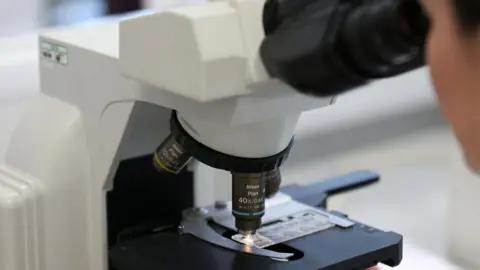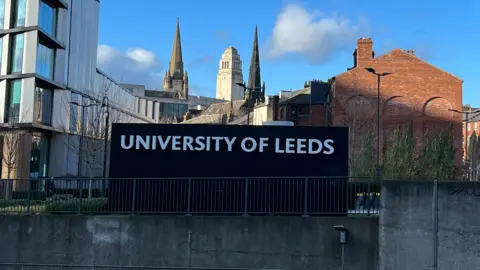Researchers hail leukaemia treatment 'milestone'
 Lynne Cameron/PA Wire
Lynne Cameron/PA WireA chemotherapy-free approach for some patients suffering from leukaemia could lead to better outcomes, scientists behind a five-year medical trial have said.
The findings of the UK-wide study, led by researchers from Leeds, could reshape the way the most common form of leukaemia in adults was treated, according to those behind the work.
The trial looked at whether using two targeted cancer drugs could prove to be more effective than standard chemotherapy among patients with chronic lymphocytic leukaemia (CLL), the most common form of leukaemia in adults.
Dr Talha Munir, consultant haematologist at Leeds Teaching Hospitals NHS Trust, who led the study, called its results a "milestone".
CLL is a rare blood cancer that affects about 3,800 people in the UK each year, most of whom are over the age of 40.
Symptoms can include persistent illness, weight loss, swelling, fatigue and anaemia, where there are not enough red blood cells in the blood.

The half-decade-long trial involved researchers from Leeds Teaching Hospitals NHS Trust and the University of Leeds and focused on 786 patients across 96 cancer centres.
Its results showed that the treatment, using two drugs, ibrutinib and venetoclax, led to better survival rates, fewer long-term side effects, and the possibility of life without chemotherapy for many patients.
According to the results of the study, which have now been published in the New England Journal of Medicine, researchers also found the alternative treatment regime was tolerated better than traditional treatments.
Dr Munir said: "We have shown a chemotherapy-free approach can be not only more effective but also more tolerable for patients.
"By tailoring individualised treatment based on how well the cancer responds, we're moving into an era of truly personalised medicine."
 Leeds Teaching Hospitals/PA wire
Leeds Teaching Hospitals/PA wireOne of the patients benefiting from the trial was Catherine Whitfield, from Farnley, Leeds, who was diagnosed with CLL in 2018 and who now has no cancer cells after three years of treatment.
Ms Whitfield, 63, said the trial had "felt right" to her.
"The way this trial was explained, it just made sense," she explained.
"Also, the thought of chemotherapy was scary to me. The trial felt right. And it was."
Ms Whitfield said she had previously lost her husband to cancer: "I have seen how hard it could be."
"My first thought after my diagnosis was, I will never see my grandchildren being born and growing up," she said.
"Now I have two grandchildren, Drew and Alaia, and they are a delight and highlight the joys of a healthy life".
Dr Munir said: "This isn't just about data. It's about people like Catherine, and thousands of others, who trusted us with their care.
"Thanks to them, we're changing the future of cancer treatment."
Listen to highlights from West Yorkshire on BBC Sounds, catch up with the latest episode of Look North.
